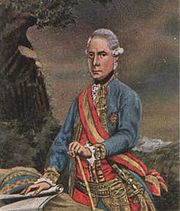
Austro-Turkish War (1787-1791)
Encyclopedia
The Austro-Turkish War of 1787 was an inconclusive struggle between the Austrian
Austrian Empire
The Austrian Empire was a modern era successor empire, which was centered on what is today's Austria and which officially lasted from 1804 to 1867. It was followed by the Empire of Austria-Hungary, whose proclamation was a diplomatic move that elevated Hungary's status within the Austrian Empire...
and Ottoman Empire
Ottoman Empire
The Ottoman EmpireIt was usually referred to as the "Ottoman Empire", the "Turkish Empire", the "Ottoman Caliphate" or more commonly "Turkey" by its contemporaries...
s. It took place concomitantly with the Russo-Turkish War of 1787-1792.
History

Joseph II, Holy Roman Emperor
Joseph II was Holy Roman Emperor from 1765 to 1790 and ruler of the Habsburg lands from 1780 to 1790. He was the eldest son of Empress Maria Theresa and her husband, Francis I...
, who was in an alliance at the time with the Russian Empire
Russian Empire
The Russian Empire was a state that existed from 1721 until the Russian Revolution of 1917. It was the successor to the Tsardom of Russia and the predecessor of the Soviet Union...
under Catherine the Great. The Turks took the military initiative, driving back the Austrians from Mehadia
Mehadia
Mehadia is a small market town and commune in Caraş-Severin County, Romania. It lies on the European route E70, in the Cerna River valley. The town is located on the site of the ancient Roman colony Ad Mediam and was noted for its Hercules baths. It had a population of 2,492 in 1900, and of 4,474...
and overrunning the Banat
Banat
The Banat is a geographical and historical region in Central Europe currently divided between three countries: the eastern part lies in western Romania , the western part in northeastern Serbia , and a small...
(1789). Later on, the balance shifted toward Austria: Belgrade
Belgrade
Belgrade is the capital and largest city of Serbia. It is located at the confluence of the Sava and Danube rivers, where the Pannonian Plain meets the Balkans. According to official results of Census 2011, the city has a population of 1,639,121. It is one of the 15 largest cities in Europe...
was taken from the Turks in a three-week campaign by the aging Field Marshal Laudon
Ernst Gideon Freiherr von Laudon
Baron Ernst Gideon von Laudon Baron Ernst Gideon von Laudon Baron Ernst Gideon von Laudon (German: Ernst Gideon Freiherr von Laudon (originally Laudohn or Loudon) (Tootzen, now Latvia, February 2, 1717 – July 14, 1790 in Nový Jičín, now Czech Republic) was an Austrian field marshal, one of the most...
. However, in the final negotiated outcome (see: Treaty of Sistova
Treaty of Sistova
The Treaty of Sistova ended the Austro-Turkish War between the Ottoman Empire and Austria. It was signed in Sistova in present-day Bulgaria on August 4, 1791....
), Austria's gains were "meagre". Miller specifies these as being "nothing more than the town of Orsova
Orsova
Orșova is a port city on the Danube river in southwestern Romania's Mehedinți County. It is one of four localities in the county located in the Banat historical region. It is situated just above the Iron Gates, on the spot where the Cerna River meets the Danube.- History :The first documented...
and two small places on the Croatian frontier."
On the Turkish side, the war was a disaster, due not to the losses of land to Austria (which were largely recovered in negotiation) but to the victories of Austria's ally Russia; see Russo-Turkish War (1787–1792).
At the front, disease played a major role. According to Volkmar Braunbehrens, in the Austrian army during 1788 there were "epidemics: the lazaretto
Lazaretto
A lazaretto or lazaret is a quarantine station for maritime travellers. Lazarets can be ships permanently at anchor, isolated islands, or mainland buildings. Until 1908, lazarets were also used for disinfecting postal items, usually by fumigation...
s were filled to capacity, half the army was sick, and thousands of soldiers died". Joseph II spent most of the war at the front, and was one of those who fell ill there; he ultimately died of his illness after his return home (20 February 1790).
The home front in Austria
Within Austria the war was "debilitating and unpopular" (Maynard SolomonMaynard Solomon
Maynard Solomon has carried out a multiple career: he was a co-founder of Vanguard Records as well as a music producer, and later became a writer on music.-Career in the recording industry:...
). He adds that "the morale of the cultural elite was severely eroded; fears of conscription led many aristocratic families to leave Vienna
Vienna
Vienna is the capital and largest city of the Republic of Austria and one of the nine states of Austria. Vienna is Austria's primary city, with a population of about 1.723 million , and is by far the largest city in Austria, as well as its cultural, economic, and political centre...
, and there were widespread feelings of disillusionment with Emperor Joseph, a sense that he had betrayed the promise of an enlightened reform movement."; see Enlightened despotism. Braunbehrens describes the war thus: "There was open opposition, ... fueled by the enormous economic burden it placed on the population. Food prices had risen drastically and in some cases doubled; bakeries had been looted for the first time in Vienna's history."
A consequence of this social disruption was that the vibrant musical life of Vienna was greatly diminished, with the closure of two opera companies and decline of concerts and salon performance. This created trouble for the career of Mozart
Wolfgang Amadeus Mozart
Wolfgang Amadeus Mozart , baptismal name Johannes Chrysostomus Wolfgangus Theophilus Mozart , was a prolific and influential composer of the Classical era. He composed over 600 works, many acknowledged as pinnacles of symphonic, concertante, chamber, piano, operatic, and choral music...
and other musicians similarly dependent on the aristocracy.

